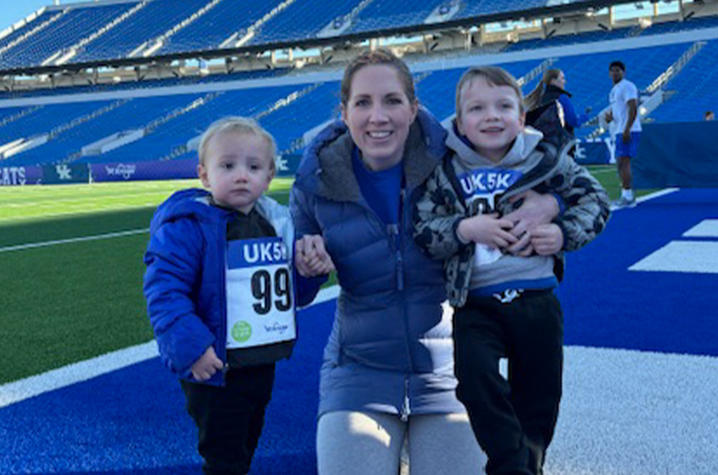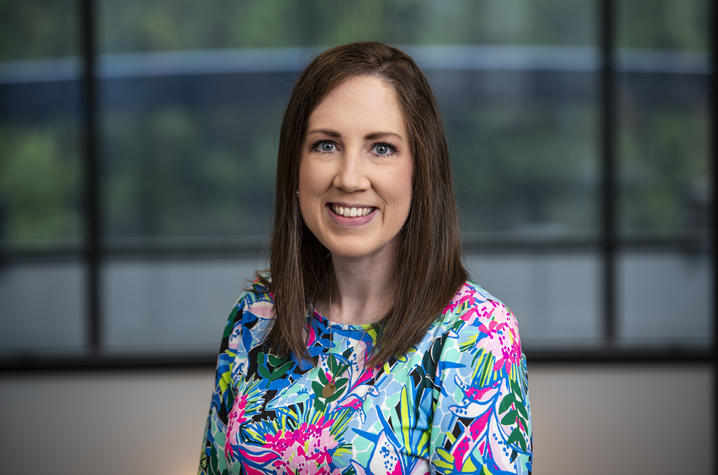Turning pain into purpose: One mom’s mission to make IVF accessible
LEXINGTON, Ky. (Oct. 27, 2025) — It’s the end of a long workday and you’re watching TV before bed. A commercial comes on — a faceless voice begins to tell you about a disease and the new drug used to treat it. People on screen smile and hold hands while a long list of side effects is rattled off at double speed. “Ask your doctor or pharmacist about…” the voice says before your show returns.
For most people, that’s the beginning and end of their relationship with specialty drugs. But for Emily Eastman, Pharm.D., associate director at the University of Kentucky Specialty Pharmacy, those moments represent the start of something much deeper: a connection to real people whose lives hinge on the drugs behind those commercials, and the pharmacists who guide them through the maze of access, affordability and care.
The path that wasn’t planned
Born and raised in Frankfort, Kentucky, Eastman always imagined a future in health care — just not in pharmacy.
After realizing that becoming a physician wasn’t right for her, she took a part-time job as a pharmacy technician at a community pharmacy.
“That’s when it clicked,” she said. “I loved helping people, loved solving problems and I realized pharmacy was where I could do both.”
Once accepted at the UK College of Pharmacy, she thrived. Most days, she could be found working at the Kentucky Clinic Pharmacy.
“I’d leave class, cross the street and see what we’d just learned in action,” she said. “It made it real.”
After graduation, Eastman chose to enter practice directly. “Some people encouraged me to consider residency, but I wanted to explore how pharmacy fit into the bigger picture of healthcare,” she said. “I wanted to understand both the patient side and the financial side.”
That mindset led her to pursue a dual Pharm.D./Master of Business Administration degree, believing that understanding the business of healthcare could make her a better advocate for patients. That decision would prove pivotal.
Building a new kind of pharmacy
Eastman’s early work at UK HealthCare involved managing a financial assistance program that ensured patients leaving the hospital could afford their medications.
“A provider can prescribe a life-saving drug, but if a patient can’t pay for it, that drug is worthless,” she said. “You’re dangling a carrot they’ll never reach.”
Her initiative helped lay the foundation for a now-thriving patient assistance program at UK.
“I like to say I was the first pharmacist to start that,” she said proudly. “It’s one of the most rewarding things I’ve done.”
That passion for access led her to specialty pharmacy, a rapidly evolving field dealing with complex, high-cost, often life-altering medications.
“If you see a drug advertised on TV, it’s probably a specialty drug,” she explained. “They’re expensive, they can be dangerous if used incorrectly and they require close, personalized management.”
She calls UK Specialty Pharmacy “the Disney World of pharmacy” — an ecosystem where clinical expertise meets compassion. What began in 2015 as a small operation on a countertop has grown into a network of more than 300 employees handling 300,000 prescriptions a year for 30,000 patients.
“Specialty pharmacists are translators, advocates and detectives,” Eastman says. “We work behind the scenes, navigating insurance barriers, verifying safety, finding financial aid — whatever it takes to make sure patients actually get the medication they need.”
When the professional becomes personal
In 2020, Eastman’s work collided with her life. Her first son, Carson, was diagnosed with pyruvate dehydrogenase complex deficiency (PDCD) — a rare, genetic mitochondrial disorder that prevents the body from converting most foods into usable energy. Without that conversion, the brain and other organs are starved of the fuel they need to function.
“His neurologist told me, ‘There’s nothing we can do,’” Eastman recalled. “And I thought, ‘Absolutely not.’”
Most children with PDCD never make it out of the hospital. Many don’t survive past infancy. When Carson was diagnosed, doctors told Eastman he might not live to see his second birthday.
Today, he’s a bright, social kindergartner.
“He’s on a clock,” Eastman said. “I don’t know how long we have. But I do know that everything I’ve learned as a pharmacist has given him a better shot.”
Drawing on her clinical background, Eastman became her son’s fiercest advocate — managing his medications, fine-tuning his ketogenic diet to optimize his limited energy metabolism and developing compounded, keto-safe drug formulations for other children with metabolic and epileptic disorders.
“It helped my son, but it also helped so many other kids,” she said. “That’s when I realized — this is what I’m meant to do.”
Her dedication as both a mother and pharmacist earned her the 2025 National Association of Specialty Pharmacy Caregiver of the Year Award. This recognition, she said, belongs as much to her patients as to her son.
“It was dedicated to Carson,” she said. “He made me a better pharmacist. He gave me purpose.”
The birth of Baby Blue
That purpose took tangible form in what Eastman affectionately calls “Baby Blue,” a fertility access program she founded in the wake of her own grueling experience with in-vitro fertilization (IVF).
To ensure she wouldn’t pass on Carson’s genetic condition to any additional children, Eastman underwent IVF and genetic screening. Despite her medical background, the process was, in her words, “a nightmare.”
“The pharmacy I had to use wanted to put a $35,000 hold on my credit card before they’d even process my prescriptions,” she said. “I thought,‘If this is what I’m going through as a pharmacist, what chance does a regular patient have?’”
Determined to change that, she worked with UK HealthCare leadership and the Kentucky Know Your Rx Coalition to drastically reduce the cost of fertility medications and provide individualized support to families navigating IVF.
“We offer medications at 40-50% of what you would pay elsewhere,” she said. “People thought it was too good to be true — they asked if we were importing them from India. But no, it’s all FDA-approved. We’re just passing on the savings UK HealthCare gets as a large health system.”
The program also helps patients access financial aid and support through every step of treatment.
“For most people, IVF isn’t just a medical process,” Eastman said. “It’s an emotional one. If you’re anxious and overwhelmed, no amount of science can make that go away. Having someone who cares can.”
Since its recent launch, Baby Blue has helped dozens of families try to conceive, with new parents-to-be sending updates on their pregnancies.
“Every time I hear a success story, it gives me pride in knowing we helped someone achieve a dream,” she admitted. “Because I know the struggle, and I know it doesn’t have to be that hard.”
Advocate and problem-solver
Eastman’s gift is in solving impossible puzzles — the patients whose insurance doesn’t cover their medication, whose free-drug programs have ended, whose diagnoses don’t fit neatly into policy boxes.
“I love disgruntled patients,” she said with a grin. “The harder the case, the better. There’s nothing like finding a way to get someone the drug they need when everyone else has told them no.”
Her team now leads innovative programs tackling financial, regulatory and access challenges across Kentucky — from oncology and immunology to rare diseases and fertility. They also collaborate with smaller clinics across the state to expand access to specialty care.
“Specialty pharmacy is growing fast,” she said. “But we can’t lose sight of the people behind the prescriptions. That’s what keeps me grounded.”
Lessons for the next generation
When she speaks to pharmacy students, Eastman’s advice is equal parts practical and passionate: work, find mentors and think critically.
“Every day is an interview,” she tells them. “How you show up matters.”
She urges students not to fear unconventional paths. “Residency is great, but it’s not the only way. The key is experience — get out there and learn from real patients. That’s how you grow.”
And perhaps most importantly, she reminds them that pharmacy is, at its heart, about people.
“We get to be part of the hardest moments of someone’s life and make them a little easier,” Eastman said. “That’s a privilege.”
Looking ahead
Even as she celebrates Baby Blue’s success, Eastman’s focus remains on the future: ensuring sustainability amid shifting health care policies, helping UK Specialty Pharmacy expand into new disease states and sharing her story through public speaking.
“I want people to know what specialty pharmacists really do,” she says. “We’re not faceless voices on television. We’re advocates, educators, problem-solvers. We’re here when the commercials end.”
In her office, tucked among spreadsheets and patient charts, Eastman keeps a photo of her four children — Carson, Graham, Sawyer and Sutton — her constant reminder of why she fights so hard for others.
“Carson’s condition taught me that medicine isn’t just about curing,” she says. “It’s about caring. It’s about giving people a chance — whether that’s a second chance at life or a first chance at giving life.”
As the state’s flagship, land-grant institution, the University of Kentucky exists to advance the Commonwealth. We do that by preparing the next generation of leaders — placing students at the heart of everything we do — and transforming the lives of Kentuckians through education, research and creative work, service and health care. We pride ourselves on being a catalyst for breakthroughs and a force for healing, a place where ingenuity unfolds. It's all made possible by our people — visionaries, disruptors and pioneers — who make up 200 academic programs, a $476.5 million research and development enterprise and a world-class medical center, all on one campus.






